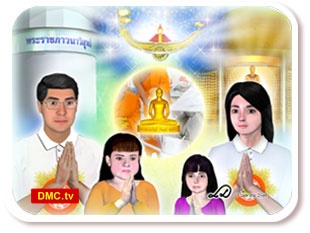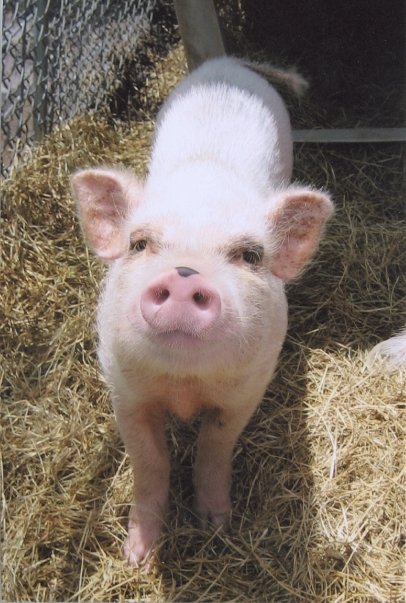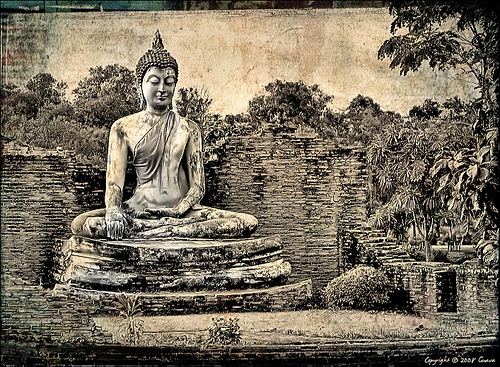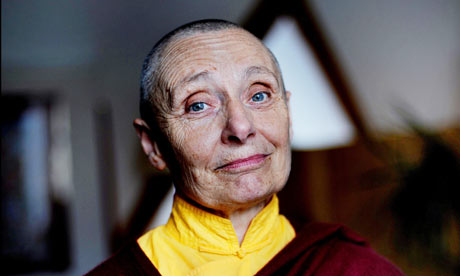ONE comes from the domain of manufactured glitz, a top dog in the material world of advertising, marketing and public relations.
 |
|
|
The other comes from the polar opposite - the world of spirituality, religious thought and practices.
But sometime in the next two months, Ogilvy and Mather (O&M) and Kechara, a Tibetan Buddhist organisation based in Kuala Lumpur, will be joining hands.
Their mission: To launch a campaign here to raise awareness of the Dharma - the teachings of the Buddha.
The campaign, which targets the 'modern, trendy professional', will stretch over 18 months.
But don't expect to see ads on buses, TV and in newspapers.
Instead, the campaign will be driven by exhibitions and exposure in lifestyle magazines via content about, say, vegetarian recipes.
Because of the softer approach, O&M calls it a 'communications campaign', rather than an advertising campaign.
For that reason, it does not plan on consulting the Media Development Authority (MDA) or the Advertising Standards Authority of Singapore.
The softer approach should also prevent a repeat of what happened in 2001, when O&M ran into trouble with the Government for launching the God campaign for the Love Singapore movement, a grouping of 150 churches.
Comprising quotes from a witty and irreverent God, the print and TV advertisements of the campaign were banned by the authorities one week after it was launched.
Treading carefully
This time round, Mr Danny Phan, 32, director of the campaign at Ogilvy PR Worldwide, the public relations arm of O&M, was careful in explaining its choice of a softer approach.
'This is not about religion,' he said. 'It's about a perspective... a way of looking at life. You do not need to be a Buddhist to practise the Dharma.'
For example, O&M plans to raise awareness about vegetarianism.
'The act in itself is very Buddhist, but we are not going out to tell people: Don't kill animals,' said Mr Phan.
Instead, what you may see is a magazine article about new-age vegetarianism, a new trend catering to the high-end market.
'The hope is that by learning about it, people will start thinking about what they eat, how they live, and eventually say... hey, vegetarianism is cool!' said Mr Phan.
Kechara declined to disclose how much it is paying O&M, but said the campaign is funded by one of its devotees, a successful businesswoman.
Kechara's head is His Eminence Tsem Tulku Rinpoche, who traces his spiritual lineage to one of the eight main disciples of Je Tsongkhapa, the founder saint of the Gelugpa school of Tibetan Buddhism.
It practises what it calls 'Dharma That Bites' - 'the pursuit of a spiritual path without having to compromise one's lifestyle or religious and cultural background'.
Staying relevant
Its website (www.kechara.com) testifies to the importance Tsem Tulku Rinpoche places on staying relevant in the modern world.
It is sleek, informative and filled with YouTube videos. It also houses an eShop that's as easy to use as eBay.
Visitors who come across interesting articles can use a spread of online tools like Digg, Reddit and Del.icio.us to share them with friends.
Tsem Tulku Rinpoche, who is recognised by the 14th Dalai Lama as the reincarnation of the 72nd Abbot of Gaden Shartse, Gedun Nyedrak, also maintains a strong presence on Facebook and Twitter.
Kechara's following in Singapore is small. According to the website, there are nine members in its cell group, and members keep up with the Rinpoche's teachings online, on top of regular trips to KL.
Increasing awareness of Tsem Tulku Rinpoche's teachings and the number of his followers are some of the goals for the campaign, said Ms Phng Li Kim, 38, the chief executive of Kechara's publishing house.
The campaign will mark O&M's third foray into what's known in the industry as 'faith branding'.
In 2007, six years after the God campaign, O&M signed up to be the global PR partner for the World Islamic Economic Forum, held in Kuala Lumpur in 2007.
The forum, held amid a growing recognition that the global Muslim population constituted a new and separate market segment, dealt with a key theme: What is 'Islamic branding'?
Mr Miles Young, chairman of O&M Asia-Pacific, led the discussion in front of a full house of representatives from Muslims countries all over the world.
Dr Hui Yew Foong, an anthropologist from the Institute of South-east Asian Studies, sees a trend.
'Christianity in this part of the world is associated with modernity and churches were the first to project themselves in a modern way,' said Dr Hui.
'Now, other religions are emulating their methods because they want to acquire the appeal of being relevant in a modern life.'
The trick is, of course, how to walk the tightrope.
While religious messages in Singapore need to be handled with sensitivity, slightly different rules apply for different media.
Compared with mass media platforms such as TV and newspapers, videos and publications target specific audiences.
Books and newsletters published by religious organisations get more leeway, explained Ms Amy Chua, director at MDA's media content and standards division.
Public exhibitions of a religious nature require an arts entertainment licence from MDA, while talks and seminars are regulated by the police.
The same tightrope - and a guarded openness - applies within the Buddhist community.
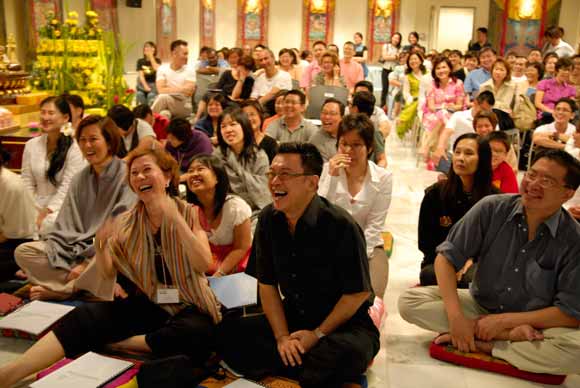 'It is okay to be modern,' said Mr Lee Bock Guan, president of the Buddhist Lodge. 'But not in excess.
'It is okay to be modern,' said Mr Lee Bock Guan, president of the Buddhist Lodge. 'But not in excess.
'You can change the method of delivering the message; the message must remain the same.
'But whatever it is, we have to see the campaign before we can judge.'
Q&A with Kechara's publishing house's chief executive, Ms Phng Li Kim, 38
What is the goal of the campaign?
'Spreading spirituality is nothing new but lifestyles today have
changed. Today, to spread spirituality, you need a more modern,
strategic approach. Our goal is to spread awareness of the Dharma. But
this is not about selling anything. You can't buy the Dharma. You have
to be aware of it, and this is what we aim to do.'
Why does Kechara feel it necessary to hire a top advertising firm to do this?
'There are many ways to get to Penang. You can walk, you can drive, or you can fly. For the same reasons you would choose to fly, if this campaign can benefit people faster, why not?'
How worried is Kechara that its message will be interpreted as proselytising?
'We are not here to convert... A person's choice of religion is personal and should be respected. At Kechara, we believe that the Dharma, while originating from Buddhism, transcends all religions on its premise of compassion and being a better person.
'As long as our motivations are pure and nobody is hurt, we are not afraid of being misunderstood.'
Why launch this campaign in Singapore?
'We're based in Malaysia, so this is a natural extension of our work.'
How will Kechara measure the success of this campaign?

